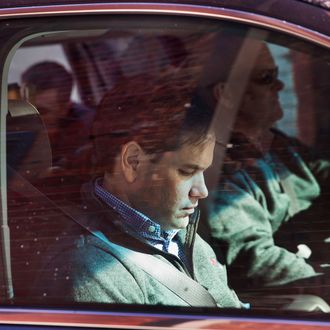
As Marco Rubio has emerged as the smart-money favorite (or at least co-favorite, along with Ted Cruz) for the 2016 Republican presidential nomination, there’s been a nagging suspicion in enemy camps and the mainstream media that the Florida senator’s history of sloppy personal finances could be used by a rival with bad intent to take him down a notch or two. It’s hardly a new story. Rubio’s use of a state GOP credit card to make personal purchases when he was Speaker of the Florida House may well have been the first time many alert national-news consumers ever heard of the man. New York Times reporters did an extensive analysis of Rubio’s financial problems just last June; the news hook was the discovery that he cashed out a retirement account in 2014, presumably to meet current obligations.
Each time the issue has arisen, Rubio and his allies have essayed a political jiujitsu move, citing his financial struggles as an example of the experience he has in common with middle-class Americans everywhere — you know, in contrast to scions like 2012 nominee Mitt Romney and current rivals Jeb Bush and Donald Trump. Since the whole son-of-a-bartender-and-a-maid meme has been central to Rubio’s political identity from the beginning, offering some protection from the charge that his policy proposals would engorge the wealth of the already-rich, making financial missteps part of his biography was indeed clever. But it hasn’t shaken the bloodhounds entirely.
Today National Journal’s S.V. Date recapitulates Rubio’s financial history from a not-very-flattering perspective: as the self-inflicted problems of a man whose political connections gave him a rapidly growing income exceeded by an outsize appetite for personal and real-estate acquisitions:
[A]s his income grew, so did the price tag on Rubio’s chosen lifestyle. In late 2004, he decided to move from the $175,000 house he had purchased in 2003 to one twice the size he was having built a few blocks away for $550,000. Rubio writes in An American Son that he needed the space for his growing family—two children already and another on the way. Yet even though the house was built to his specifications, Rubio in 2005 quickly secured a $135,000 home-equity loan on it. Also that year, Rubio and his close friend and political ally David Rivera (now a former congressman implicated in a criminal federal campaign finance investigation) bought a $135,000 house together in Tallahassee to use when the legislature was in session.
During this period, Rubio put little into retirement or savings, so that when the state’s real estate market eventually tanked, his net worth did as well, falling from $316,555 in 2005 to $8,352 in 2008. In 2010, as Rubio started running for Senate, his Tallahassee home was almost foreclosed upon because he and Rivera went five months without making a payment; Rivera delivered a check for the past-due balance at the last minute to stop the bank’s legal action.
Why is this take on Rubio’s misfortunes potentially political dynamite in the right, malevolent hands? It’s simple: There is a strong conviction among conservative Republicans that the entire financial crisis that devastated the U.S. economy in the last decade was essentially the product of minority Americans taking out mortgages they could not afford, egged on by ideologues in the federal government and government-backed lending institutions. Marco Rubio’s own “story” comes uncomfortably close to that stereotype. And it’s all the more dangerous because, unlike the bankruptcies undertaken by Donald Trump’s companies, the choices Rubio made are quite familiar to the middle class Americans who made other choices and avoided feeding a wolf at their door. Cashing out the 401(k) to pay the bills is truly a middle-class nightmare, something to be avoided at any cost, and arguably an immoral act that could impose future obligations on one’s children. The whole profile sits uncomfortably with a conservative senator who routinely attacks government overspending and debt, and deplores the current condition of retirement programs.
The big question is whether any of Rubio’s opponents have the resources and skill to depict Rubio not as a typical American climbing the slippery pole to prosperity, but as one of those people who don’t meet their obligations and haven’t made the sacrifices good, virtuous Republican voters have made. There is one opponent whose desperate efforts to survive are clearly being blocked by Rubio, and who still has huge super-pac resources directed by a man who has repeatedly suggested this largesse might be used for negative ads against Rubio and others. That would be Jeb Bush’s ally Mike Murphy, executive director of Right to Rise. Don’t be surprised if he guarantees Rubio’s finances are the talk of the Republican electorate by the time actual voting begins in February.






























